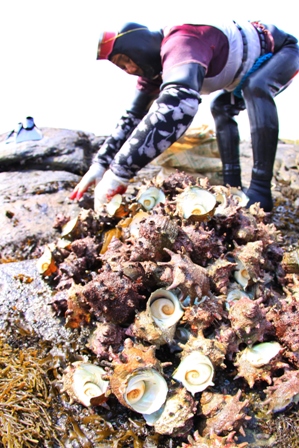|
[Note: An earlier form of this article first appeared in Jeju Haenyeo, Stewards of the Sea, Book II, written by Dr. Hilty on commission of Jeju Sea Grant Center, Jeju National University, and published in May 2015 by The Jeju Weekly.]
| |
 |
|
| ▲ A haenyeo piles up turban shells, or sora. Photo courtesy Jeju Special Self-Governing Province |
How do you sustain a cultural practice that has outlived its era?
How can the Jeju haenyeo continue their way of life, and their contribution to this island culture -- when their work is both dangerous and no longer necessary, the local seas are depleted due to overfishing and climate change, and the young do not take up the profession?
The core concepts of cultural preservation are relevance, reframing, and replicability. To retain a traditional practice, it must remain relevant to the modern era. Reframing refers to viewing something familiar in a new way. And replicability ensures that the practice can be duplicated -- and, sustained indefinitely.
In September 2012, more than 10,000 people descended on Jeju for what is typically billed as the 'environmental olympics': the quadrennial World Conservation Congress [WCC] of the International Union for Conservation of Nature [IUCN], a consortium of 1200 governments and 11,000 volunteer specialists from 160 countries.
Leading up to this event, Jeju provincial government submitted five motions for consideration on local conservation matters, including the safeguarding of Jeju haenyeo culture.
The motion, "Supporting the Sustainability of Jeju Haenyeo as a Unique Marine Ecology Stewardship," was voted into resolution [WCC-2012-Res-082] and these same consortium members became duty-bound to contribute to the preservation of Jeju women divers' culture. Of particular importance was the wording of the resolution, contributed by this writer, which emphasized many environmentally sustainable practices of the haenyeo as well as their unique knowledge of the marine environment.
One of the specialists to attend the WCC was Dr. Sylvia Earle, renowned marine biologist and National Geographic's explorer-in-residence for more than 20 years. Having read articles concerning the Jeju haenyeo published by this writer, Dr. Earle requested a meeting, and we discussed at length the options for preserving this traditional practice in its cultural matrix.
Dr. Earle's primary suggestion was that the Jeju haenyeo, rather than continue to collect sea creatures (to which Dr. Earle is singularly opposed, as she has made it her life's work to resist the fishing of the sea), could and in fact should be considered 'indigenous marine biologists' supported by the local and national governments.
While the majority of haenyeo have no more than a primary school education, a percentage of them illiterate, it is nevertheless their inherent knowledge of the sea that surrounds Jeju Island -- its marine life both flora and fauna, topography, tide and seasonal cycles, and changes over time due to climate fluctuations but also perhaps to overfishing -- which is their highest value. For many, they have been diving regularly for several decades, and are thus storehouses of knowledge that no one else possesses in the same manner.
This is an idea worthy of further exploration. It is a natural collaboration between Jeju National University and the local haenyeo population, one which the Jeju Sea Grant Center could potentially oversee. The haenyeo contain a wealth of knowledge gathered over a very long period of time, and can be taught basic data collection techniques.
The university faculty and students possess knowledge and skill in research methodology as well as the writing skills necessary for academic publication. With haenyeo as their informants, a great deal of new research could be developed, funded not only by government but also by research grants and environmental as well as cultural sources of funding.
The United Nations, including UNESCO and also UN Women, have emphasized the value of indigenous wisdom for some years, and would no doubt be eager to lend their support to such an endeavor. Other organizations, including not only the IUCN consortium on the environmental conservation side but also, for example, International Centre for the Study of the Preservation and Restoration of Cultural Property [ICCROM] on the cultural conservation front, would likely be very interested.
In this manner, the haenyeo work is reframed and elevated, becoming highly relevant to the 21st century, no longer contributing to overfishing of the local sea, and attractive once more to the young generation as a unique type of marine biologist. This could well prove to be the adaptation necessary for the preservation of this valuable cultural practice.
--
Dr. Hilty is a cultural psychologist who has researched and written about Jeju culture, particularly the haenyeo, for nearly 5 years. She is appointed by Jeju Provincial Government as an Honorary Ambassador for Jeju Island. |




















